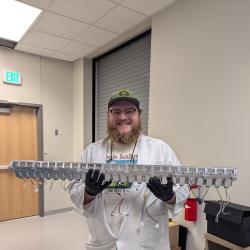Six College Faculty Members Elected American Physical Society Fellows
The new fellows come from the physics and astronomy departments.
Six researchers in the University of Maryland College of Computer, Mathematical, and Natural Sciences (CMNS) have been elected fellows of the American Physical Society. This honor reflects exceptional contributions to the physics enterprise such as outstanding physics research, important applications of physics, leadership in or service to physics, or significant contributions to physics education.
The six new fellows are:
- Michelle Girvan
- Wolfgang Losert
- Johnpierre Paglione
- A. Surjalal Sharma
- Jacob Taylor
- Edo Waks
Michelle Girvan, an associate professor of physics with joint appointments in the Institute for Research in Electronics and Applied Physics (IREAP) and the Institute for Physical Science and Technology (IPST), was cited for her work in the nonlinear and statistical physics of complex networks including characterization of network structures and dynamics and interdisciplinary applications.
Girvan earned her B.S. in math and physics from the Massachusetts Institute of Technology and her Ph.D. in physics from Cornell University. She joined UMD in 2007 after a postdoctoral appointment at the Santa Fe Institute. Girvan was a visitor at the Institute for Advanced Study from 2008 to 2009, and in 2017 she received the Richard A. Ferrell Distinguished Faculty Fellowship. She is also director of the Computation and Mathematics for Biological Networks program.
Wolfgang Losert, a professor of physics with a joint appointment in IPST, was cited for his imaginative studies of complex living systems and for numerous contributions toward understanding dynamical properties of complex systems at the convergence of physics, materials science and biology.
Losert earned his Diplom in applied physics from the Technical University of Munich in Germany. He holds a Ph.D. in physics from the City College of the City University of New York and joined UMD in 2000 after appointments at Haverford College. Losert has served as director of the UMD biophysics graduate program and is currently director of the National Cancer Institute-UMD Partnership for Integrative Cancer Research and the associate dean for faculty affairs, graduate education and research in CMNS. In 2006, he received the Richard A. Ferrell Distinguished Faculty Fellowship.
Johnpierre Paglione, a professor of physics, was cited for experimental contributions toward the understanding of strongly correlated and topological electronic materials through the synthesis and investigation of heavy fermion compounds, unconventional superconductors and topological materials.
Paglione, who joined UMD in 2008, earned his B.S. in engineering physics from Queen’s University in Kingston, Canada. He earned his M.S. and Ph.D. in physics from the University of Toronto. Paglione received a National Postdoctoral Fellowship Award from the Natural Sciences and Engineering Council of Canada, a Materials Synthesis Investigator Award from the Gordon and Betty Moore Foundation, a Department of Energy Early Career Award, the 2012 Richard A. Ferrell Distinguished Faculty Fellowship, and a National Science Foundation Early Career Development (NSF CAREER) Award. He is currently the director of the Center for Nanophysics and Advanced Materials and is an associate fellow of the Canadian Institute for Advanced Research Quantum Materials program.
A. Surjalal Sharma, a principal research scientist in the Department of Astronomy, was cited for pioneering and sustained contributions toward nonlinear dynamical modeling of non-equilibrium phenomena in space physics, the development of data-enabled science and leadership in fostering international collaborations.
Sharma earned his B.S. and M.S. in physics from University of Delhi in Delhi, India, and his Ph.D. in physics from Gujarat University in Ahmedabad, India. He received the inaugural CMNS Dean’s Distinguished Research Scientist Award in 2011, the American Geophysical Union Lorenz Lectureship in 2009, the Manipur Association for the Promotion of Science Distinguished Scientist Award in 2008 and the NASA Group Achievement Award in 1998. He also serves as director of the UMD division of the Goddard Planetary Heliophysics Institute.
Jacob Taylor is an adjunct associate professor of physics and co-director of the Joint Center for Quantum Information and Computer Science (QuICS). He is also a physicist at the National Institute of Standards and Technology (NIST) and a fellow at the Joint Quantum Institute (JQI). Taylor was cited for wide ranging contributions in using quantum properties of light and matter toward developing applications ranging from extreme sensitivity sensors and transducers to quantum information processing.
Taylor received his A.B. degrees in astronomy and physics and his Ph.D. in physics from Harvard University. He was a Pappalardo Fellow at the Massachusetts Institute of Technology before joining NIST and JQI in 2009 and QuICS in 2014. He received a Presidential Early Career Award for Scientists and Engineers, a Department of Commerce Silver Medal, a NIST Sigma Xi Young Scientist Award, and a C15 Young Scientist Award from the International Union of Pure and Applied Physics.
Edo Waks is a professor with joint appointments in electrical and computer engineering, physics and IREAP. Waks, who is also a JQI fellow, was cited for significantly advancing the field of quantum photonics and for developing new concepts to strongly interact solid-state quantum emitters with light using nanophotonic structures.
Waks received his B.S. and M.S. in electrical engineering from Johns Hopkins University and his Ph.D. in electrical engineering from Stanford University. After a postdoctoral appointment at Stanford University, he joined the UMD Department of Electrical and Computer Engineering in 2008. He accepted a joint appointment with the UMD Department of Physics in 2017. Waks researches nanoscale photonic and semiconductor devices for applications in quantum computation, communication and sensing. He is a fellow of the Optical Society of America, and he received a Presidential Early Career Award for Scientists and Engineers, an NSF CAREER Award, a Defense Advanced Research Projects Agency Young Faculty Award, and an Army Research Office Young Investigator Program award.
###
Media Relations Contact: Irene Ying, 301-405-5204, zying@umd.edu
University of Maryland
College of Computer, Mathematical, and Natural Sciences
2300 Symons Hall
College Park, MD 20742
www.cmns.umd.edu
@UMDscience
About the College of Computer, Mathematical, and Natural Sciences
The College of Computer, Mathematical, and Natural Sciences at the University of Maryland educates more than 7,000 future scientific leaders in its undergraduate and graduate programs each year. The college’s 10 departments and more than a dozen interdisciplinary research centers foster scientific discovery with annual sponsored research funding exceeding $150 million.







